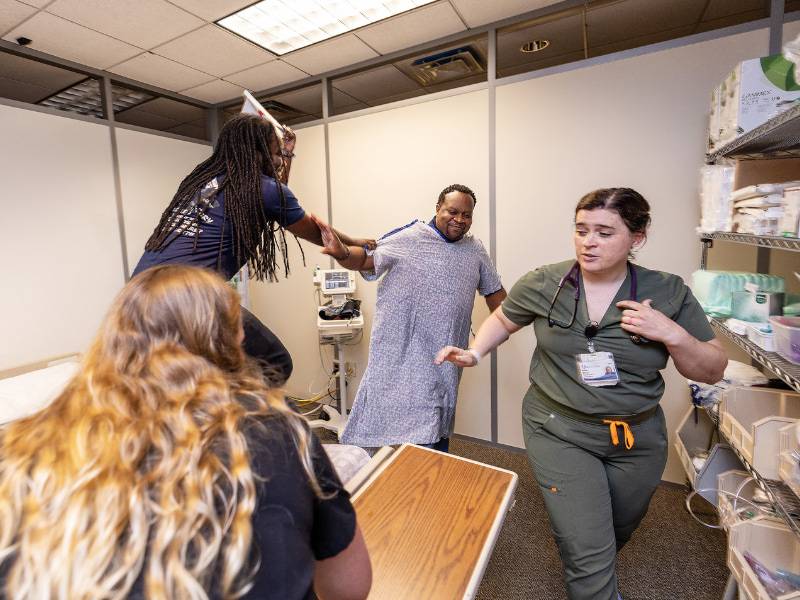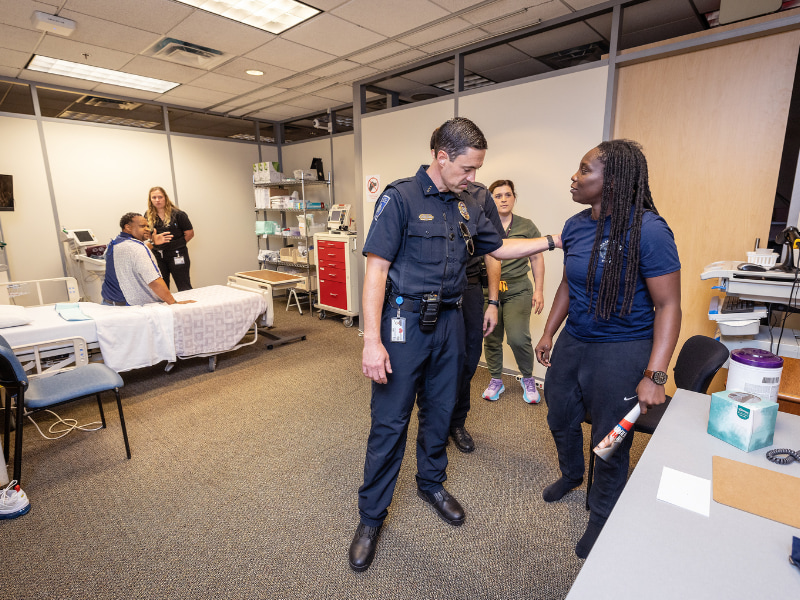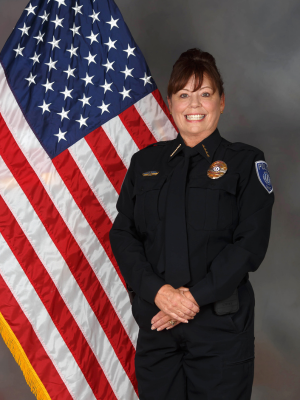Simulations with UMMC Police give nursing students experience in de-escalating conflict

A man in the emergency department is arguing with his wife. First insults are thrown, then a tissue box and punches. The nurses in the room must separate the two to protect their patient and keep the fight from escalating while calling police officers for help.
That was one of the scenarios University of Mississippi Medical Center Accelerated Bachelor of Science in Nursing students faced during simulations with officers from the UMMC Police and Public Safety Department. The Accelerated BSN allows students who have earned four-year degrees in other subjects to earn a BS in nursing in a year.
The pilot simulation program will be included for a broader audience of nursing students starting this fall.
During simulations, students faced situations including domestic violence, a patient who has a gun and a patient facing a mental health crisis.
“Any of these situations could happen at any time in any hospital with no notice,” said Dr. Robyn MacSorley, assistant professor and director of Clinical Skills and the Simulation Lab at UMMC’s School of Nursing.
Deputy Chief of Police Joshua Bromen reached out to the School of Nursing about incorporating workplace violence events into our nursing simulations, said LaTisha Beasley, simulation coordinator in the school’s Clinical Skills and Simulation Lab.

“This simulation brought awareness to the students that situations can become unstable rapidly,” Beasley said. “Students were able to practice de-escalation techniques to help control the situation in a safe manner, keeping themselves, the patient and others around them safe.”
Bromen said the simulation pilot stems from the goal of defusing crises before they escalate.
“We also want to expose nursing students to these situations before they experience them in real life,” Bromen said. “These simulations are their baseline experiences. If they are in similar situations later, they’ll know what to do, and that will make their work environments safer.”
Bromen said the program is available to other schools across the UMMC campus. He hopes the lessons in de-escalation will also be adopted by other nursing programs and hospitals.
Officers Shanice Mays and Charles Hawthorne played the roles of a combative couple, each saying and doing things that would escalate the situation and distract the nursing students from providing care. During the 10-minute exercise, the students were able to recognize when to contact police for help by pressing a panic button.
“It could take police minutes to get there, depending on the location, so it’s important for nurses to know how to de-escalate a situation,” Bromen said.
Situational awareness is an important de-escalation tool, said Dr. Lishia Lee, associate professor of nursing, during the simulation debriefing. That can include everything from knowing where exits are to the situation of each patient.
“Situational awareness is something you need to use for every patient you take care of,” she said.
Chief Mary Paradis, executive director of public safety for UMMC Police, said collaboration with the School of Nursing is part of the department’s commitment to community policing.

“By helping nursing students learn how to respond to a crisis, our officers are promoting safety and becoming a part of the fabric of the community we serve,” she said.
Hawthorne said the students kept calm throughout the exercise. “They stayed focused on care.”
Bromen agreed. “You’ve all done a very professional job and should be proud of yourselves,” he told the students, who will be working as registered nurses in about a year after passing licensure tests.
Nursing student Sarah Keaton Odom of Brandon said the simulation was an important lesson in her professional education. “If I experience something like this in my career, it will be easier for me to handle. It won’t be my first experience.”
Similar training is available to any of UMMC’s schools and departments. Email CommandStaff-Police@umc.edu to schedule a meeting to discuss training options.


